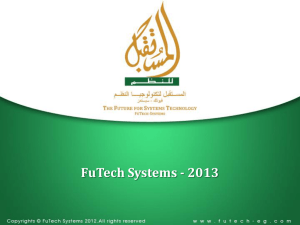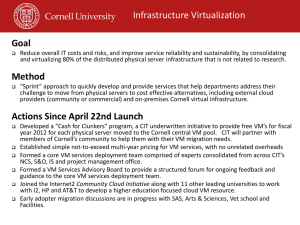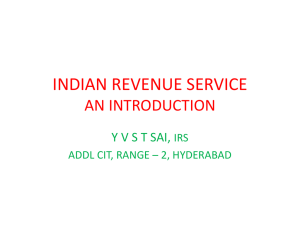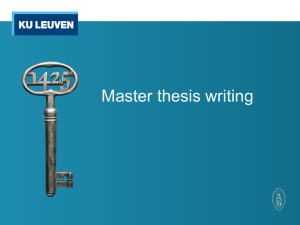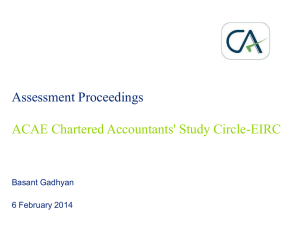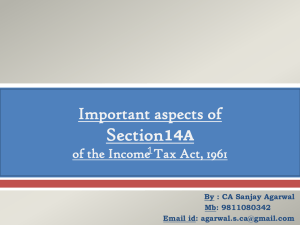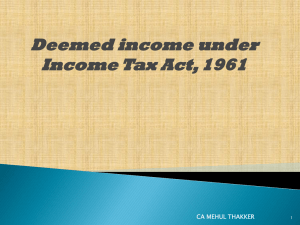Recent Case Laws in Direct Taxes
advertisement
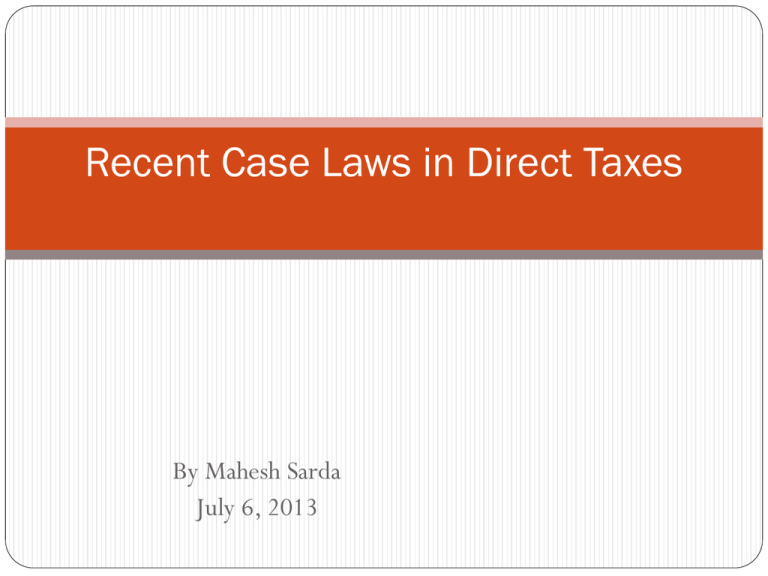
Recent Case Laws in Direct Taxes By Mahesh Sarda July 6, 2013 Supreme Court Judgments 2 © 2013 Deloitte Haskins & Sells I.C.D.S. Ltd. v. CIT 29 taxmann.com 129 Facts: • ‘A’ engaged in business of hire purchase & leasing bought vehicles from manufacturers • • • • • • 3 and leased out to its customers who were actually registered as owners of the vehicle. Claimed depreciation in relation to vehicles which had been financed but registered in name of customers. Also claimed depreciation at a higher rate-being used in the business of running on hire. AO disallowed depreciation and higher rate as “A” was neither the “owner” nor “used” for purposes of business. The CIT(A) & tribunal – allowed on both the counts. However, the High Court reversed – only a “financer” and not the “owner” of the vehicles. On appeal to Supreme Court: I.C.D.S. Ltd. v. CIT (29 taxmann.com 129) (cont…) Decision: • S.32 requires twin conditions: Asset must be “owned, wholly or partly, and Used for the purpose of the business. • 4 Ownership: A vehicle along with its keys, was delivered to the assessee upon which, the lease agreement was entered into which provides that o “A” exclusive owner of vehicle at all point of time o If lessee committed default “A” empower to re-possess o At conclusion of lease period, lessee obliged to return the vehicle o “A” has right to inspect the vehicle at all times. • Department’s objection - end of lease period the ownership of vehicles is transferred to lessee at nominal value - not important - “A” has right to retain the legal title against the rest of the world - owner of the vehicle in the eye of law. I.C.D.S. Ltd. v. CIT (29 taxmann.com 129) (cont…) The clues qua ownership lies in the lease agreement itself, which clearly point in favour of the “A” Also analysed sub section 30 of section 2 and sub section 4 & 5 of section 51 of Motor Vehicle Act. Relied on the decision of Supreme Court in case of Mysore Minerals Ltd. v CIT 106 Taxman 166. Held that “A’ is owner of the Assets. • Used for the purpose of business “A” had not “used the vehicles is also not acceptable because the vehicle was “used” by the “A” in it’s business of leasing. Once it is held that leasing out of the vehicles is one mode of doing business by the “A” and the income derived from leasing out is treated as business income it would be contradictory, in terms, to say that the vehicles are not used wholly for the purpose of the “A” business. Relied on the Supreme Court decision in case of CIT v Shaan Finance (P) Ltd. (1998) 231 ITR 308 5 I.C.D.S. Ltd. v. CIT (29 taxmann.com 129) (cont…) • Higher rate of depreciation 6 Import of the same term "purposes of business", used in the second proviso to section 32(1) gains significance. The interpretation of these words would not be any different from that which was ascribed to them earlier, under section 32(1). Therefore, the “A” fulfills even the requirements for a claim of a higher rate of depreciation CIT vs. Smifs Securities Ltd. 24 taxmann.com 222 Facts: • In scheme of amalgamation with ‘Y’ ltd, assets and liabilities of ‘Y’ Ltd. were transferred. • Excess consideration paid over value of ‘net assets’ acquired of ‘Y’ Ltd. considered as goodwill on which depreciation was claimed. • AO rejected claim for depreciation as ‘goodwill’ was not an asset falling under Explanation 3 to section 2(1). On appeal to High Court. Decision: • Sub para (b) of Explanation 3 defines intangible assets: “intangible assets, being know-how, patents, copyrights, trademarks, licenses, franchises or any other business or commercial rights of similar nature.” 7 CIT vs. Smifs Securities Ltd.] 24 taxmann.com 222 (cont …) • Goodwill falls under the expression ‘any other business or commercial rights of similar nature’. • The principle of “ejusdem generis” would strictly apply while interpreting the said expression. • The principle between the cost of an asset and the amount paid constituted goodwill and that the assessee-Company in the process of amalgamation required a capital right in the form of goodwill because of which the market worth of the “A” stood increased. • In view of the above, depreciation on ‘goodwill’ is allowable under the said section. 8 CIT vs. Textool Co. ltd. Civil Appeal No. 447 of 2003 Facts: • The “A” set up a gratuity fund which was duly approved by the CIT. • Paid an amount of Rs. 50 lakhs as initial contribution and an amount of Rs. 5 lakhs as annual premium to “LIC” pursuant to the group Life Assurance Scheme framed by the LIC for the benefit of the employees of the “A” instead of paying directly to the fund. • In the next year, amount paid directly to gratuity fund and in turn fund has made the payment to LIC. • Disallowed the claim for deduction - payment towards the gratuity fund was made to LIC and not to an approved gratuity fund, therefore, not allowable u/s 36(1)(v) • The CIT(A), Tribunal and High Court (257 ITR 39 (Mad)) upheld the “A” claim on the basis that the payment to LIC under the Group Life Assurance Scheme was for the exclusive benefit of the employees of the “A” under the policy issued by it and that the conditions stipulated in section 36(1)(v) had not been violated. 9 CIT vs. Textool Co. ltd. Civil Appeal No. 447 of 2003 (Cont…) Decision: • Though a fiscal statute has to be construed strictly and nothing should be added to or subtracted from it, yet a strict construction of a provision does not rule out the application of the principles of reasonable construction to give effect to the purpose and intention of any particular provision of the Act. • A bare reading of s. 36(1)(v) manifests that the real intention behind the provision is that the employer should not have any control over the funds of the irrevocable trust created exclusively for the benefit of the employees. • “A” had absolutely no control over the fund created by the LIC for the benefit of the employees of the “A” and further all the contribution made by the “A” in the said fund ultimately came back to the Gratuity Fund, approved by the CIT. • Thus, the conditions stipulated in section 36(1)(v) were satisfied. 10 Price Waterhouse Coopers (P) Ltd. 25taxmann.com 400 Facts: • Failure to add provision of gratuity to its total income when already disallowed in the tax • • • • • • 11 audit report filed was corrected in revised return filed and that after reopening. AO imposed 200% penalty u/s 271(1)(c). The Tribunal reduced to 100% on the view that it was silly mistake considering the caliber and expertise of the competent organization. : Decision: Reputed firm having great expertise even could make a ‘silly’ mistake It was not even noticed by the AO who framed the original assessment order and made a mistake in overlooking the contents of tax audit report. Calibre and expertise of “A” have little to do with an inadvertent error. The contents of Tax Audit Report – no question of concealing its income and no question of furnishing any inaccurate particulars. All that has happened in the present case is through a bonafide and inadvertent error. CIT vs. Nalwa Sons Investment Ltd. 21 taxmann.com 184 • SLP dismissed against judgement of Delhi High Court in CIT v. Nalwa Sons investment Ltd.[2010] 194 taxman 387. HIGH COURT’S RULING • When assessment was made on income computed under section 115JB and tax had been paid on income so computed, penalty under section 271(1)(c) would not be imposed with reference to additions that would have been made taking into account concealment made by assessee while making assessment under normal procedure 12 CIT vs. Silver Oak Laboratories Civil Application 18012/2009 S. 194C has been amended by the Finance (No.2) Act, 2009, w.e.f. 1.10.2009 to provide that “work” includes manufacturing or supplying a product according to the requirement or specification of a customer by using material purchased from such customer. It is clarified that the definition of the word “work” will not include manufacturing or supplying a product according to the requirement or specification of a customer by using material purchased from a person other than such customer. Note: This impliedly approves the view taken in Glenmark Pharmaceuticals 324 ITR 199(Bom) 13 CIT v. Bongaigaon Refinery and Petrochemical Ltd. 25 taxmann.com 230 Facts: • Deduction u/s 80HH claimed on the three different and separate units set up for • • • 14 refinery, petrochemical and polyster staple fibre business was allowed by AO after examining unit wise P&L account. CIT however found that P&L account was not supported by bifurcation of profits amongst three units and disallowed deduction invoking s.263 holding that segregated accounts for each unit should have been maintained to avail benefit of 80HH and 80-I. Decision: Neither s.80HH nor s.80-I statutorily obliges for maintaining accounts unit-wise. It was open to maintain consolidated accounts. From which unit wise net profit should be worked out. Once such working is certified by the Auditors the net profit computation (unit-wise) could be placed before the AO who can find out whether such profit(s) is properly worked out and on that basis compute deduction under Section 80HH/80I. High Court Decisions 15 © 2013 Deloitte Haskins & Sells CIT vs. Birla VXL Ltd.[2013] 32 taxmann.com 330 (Gujarat) Facts: • Incentives from State Govt. as sales-tax waiver/deferment for modernization of • • • 16 existing industries in under developed area treated as revenue receipts instead of capital receipts. CIT(A) reversed the order observing the purpose as capital investment. Tribunal confirmed the order of CIT(A). On Revenue’s appeal to High court: Decision: The basic test with respect to the purpose of subsidy needs to be applied judging the character of subsidy in the hands of recipient, whether revenue or capital as laid down by Supreme Court in case of Sahney Steel and Press Works Ltd 228 ITR 253 (Supreme Court) The point of time at which the subsidy is paid, the source of the fund and the form of subsidy is irrelevant and immaterial. CIT vs. Birla VXL Ltd.[2013] 32 taxmann.com 330 (Gujarat) (cont…) • If the payment is in nature of subsidy to assist the assesse in carrying on its trade or business, it is a trade receipt. However, if the purpose is to help the assesse to set up its business or complete the project, it should be treated as having been received for capital purposes. • Incentives were given to industries existing in under-developed areas to undertake modernization. Main purpose of the resolution was to modernize existing industries which ordinarily would come at a considerable cost, particularly when such industries were located in under-developed areas • Scheme was framed giving benefit of the Sales Tax Waiver/Deferment Benefit had to be computed in terms of the percentage of the fixed capital investment. • Benefit, though computed in terms of Sales Tax liability in the hands of the recipient, the same was not mean to give any benefit on day-to-day functioning of the business, or for making the industry more profitable. The principle aim of the scheme was to cover the capital outlay already made in undertaking special modernization of its existing industry. 17 Facts: CIT vs. Kiccha Sugar Company Ltd. (Uttrakhand) Civil Appeal No. 50 of 2009 • EPF collected not paid within ‘due-date’ specified in PF Act but paid before filing of • • • • • 18 return of income. AO assessed the amount received as income u/s 2(24)(x) and refused deduction u/s 36(1)(va) on the ground that amounts were not paid within due date. CIT(A) and tribunal allowed deduction u/s 43B(b) of the Act. Department filed an appeal Revenue’s contention: 43B did not apply to employees’ contribution. In section 36(1)(va) “Due date” has been defined in Explanation to Section which is under: “For the purpose of this clause, “due date” means the date by which the assessee is required as an employer to credit an employee’s contribution to the employee’s account in the relevant fund under any Act, rule, order or notification issued thereunder or under any standing order, award, contract of service or otherwise” Due date as per PF Act or not as per Income Tax Act CIT vs. Kiccha Sugar Company Ltd. (Uttrakhand) (Civil Appeal No.50 of 2009 (Cont…) Decision: • S.2(24)(x) provides amounts of employees’ contribution to provident fund collected by employer to be assessed as his income and s.36(1)(va) provides for deduction of the employee’s contribution if paid within the ‘due-date’ of given legislation. • S.43B(b) provides that sum payable by employer by way of any contribution to provident fund, etc shall be allowed if paid before due date of filing of ROI. • “Due-date” in s.36(1)(va) for payment of EPF, ESIC, etc. contribution should be read with s.43B(b) of the Act to mean “due-date” for filing ROI. • The AO has wrongly proceeded on the basis that the ‘due-date in s.36(1)(va) is the due date fixed by the PF Authority, whereas read in the context of s.43B(b) it is the “due-date” fixed for filing ROI. 19 CIT vs. Kiccha Sugar Company Ltd. (Uttrakhand) (Civil Appeal No.50 of 2009 (Cont…) Controversy: • The same view is taken by Delhi High Court in case of AIMIL 321 ITR 508 (Del) • However, recently the ITAT Mumbai in case of LKP Securities has refused to follow the decision of Delhi High Court on the ground that s. 43B applies only to “employer’s contribution” and Hon’ble High Court did not notice the condition of section 36(1)(va) of the Act. 20 CIT vs. Syed Ali Adi 33 taxmann.com 212 (Andhra Pradesh) Facts: • Deduction was claimed u/s 54 on purchase of two independent flats with sale • • • • 21 proceeds of an ancestral house property. AO restricted the claim to only one flat since two flats were separated by strong wall, purchased from different vendors under separate sale deeds. CIT(A) allowed 100% deduction.Tribunal confirmed with CIT(A) Decisions : High court has dismissed the appeal of the department relying on following decisions Karnataka High court in case of D.Ananda Basappa’s 309 ITR 329 : "a residential house" in Section 54 (1) of the Act has to be understood in a sense that the building should be of residential nature and "a" should not be understood to indicate a singular number and where an assessee had purchased two residential flats, he is entitled to exemption under Section 54, more so when the flats are situated side by side and builder has effected modification of the flats to make it as CIT vs. Syed Ali Adi 33 taxmann.com 212 (Andhra Pradesh) (cont…) one unit, despite the fact that the flats were purchased by separate sales deeds”. • Karnataka High Court in CITV Smt. K.G.Rukmaniamma 196 taxman 87 “Where four flats in a single residential complex were purchased by the assessee, it was held that all four residential flats constituted a residential house for the purpose of section 54” • Delhi High court in case of Prem Prakash Bhutani wherein it was held that “exemption u/s 54 only requires that property should be of residential nature and the fact that the residential house consists of several independent units cannot be an impediment to grant relief u/s 54 even if such independent units were on different floors” 22 Maersk Co. Ltd. 33 taxmann.com 165 (UttraKhand) Facts: • The “A” was a non-resident company engaged in certain businesses in India for which it employed 13 Danish nationals for doing work in India and remunerated them for doing such work. • Having regard to the fact, principally, that those 13 Danish nationals received salaries for services rendered in India, the AO and the CIT (Appeals) held that their salaries were taxable in India. • On appeal, the Tribunal held that those remunerations were, in view of the Treaty between India and Denmark, taxable in Denmark and not in India. • Section 5(2) of the Act - total income of any previous year of a person, who is non resident includes all income from whatever source derived which is received or deemed to be received in India in such year by or on behalf of such person; or accrues or arises or is deemed to accrue or arise to him in India during the year. 23 Maersk Co. Ltd. - 33 taxmann.com 165 (Uttrakhand) (cont…) • Section 9(1)(ii) - Income which falls under the head “salaries”, if is rendered in India shall be regarded as income earned in India. • Undisputed facts - all the 13 peoples were Danish nationals and stayed in India for less than 183 days and received salary for services rendered in India • As per DTAA between India and Denmark – remuneration derived by a resident of either of those two countries in respect of an employment excercised in the other country shall be taxable only in the country to which he belongs. If he is Present in the other country for a period or periods not exceeding in the aggregate 183 days in fiscal year of the other country Remuneration is paid by or on behalf of employer, who is not a resident of other country Remuneration is not borne by a permanent establishment or fixed base which is the employer has in the other country 24 Maersk Co. Ltd. - 33 taxmann.com 165 (Uttrakhand) (cont…) • In present case, it is found that all 13 peoples were stayed for less than 183 days and payment was made by non resident employer and not borne by PE or fixed base which employer has in India, therefore not taxable. • There was dispute in regard to the residence of assessee, whether resident of Denmark or UK, where it held that residence is of hardly any importance as, the treaty requires employer to be a non-resident of India and not necessarily a resident of Denmark. 25 CIT vs. Kutchi Dasa Oswal Moto Pariwar Ambama Trust 212 taxman 435 (Gujarat) Facts: • AO rejected application seeking registration u/s 12A - no documentary evidence was submitted regarding its activities and as a result, department will totally remain in dark as to actual activities carried out by trust since inception. • The Commissioner keeping same view of AO denied registration u/s 12AA of the Act. Decision: • The Commissioner has to satisfy himself regarding the objective of the trust and genuineness of the activities. • Merely on the ground that activities of trust had not commenced, application u/s 12AA cannot be rejected. 26 Gujarat High Court’s judgments for section 80IB (10) Nikhil Associates & Safal Associates ITA No.1155 & 1357 of 2011 • AO disallowed the deduction claimed u/s 80-IB on the ground that Assessee (i.e. developer) was not the owner of land on which construction of Residential units were carried out. • Hon’ble High court following own decision of Radhe Developers reported at [2012] 341 ITR 403(Guj), held that developer need not be the owner of the land Sathdar Enterprises ITA No. 1389 &1390 of 2011 • Deduction u/s 80-IB cannot be denied even when Assessee follows “Project Completion method” instead of “Percentage Completion method” as prescribed by AS-7(Revised). 27 Gujarat High Court’s judgments for section 80IB (10) (cont..) Tarnetar Corporation ITA No. 1241 of 2011 • Local authority declined BU permission on technical grounds and not for non- completion of construction. The permission was then granted by an order dated 193-2009. • Construction was completed before 31/03/08, several units were sold before that date and application was also moved for BU permission on 15/02/06 i.e. almost two years before the cut-off date. • The Local authority had rejected such application on 01/07/06 for some technical reasons and not on the ground of non-completion of construction. Thereafter, upon revised efforts from the assessee, it granted the said permission by an order dated 19/03/09. • The High Court held that not every condition of the statute can be seen as mandatory. If substantial compliance thereof is established on record, a minor deviation thereof would not vitiate the very purpose for which deduction was being made available. 28 Miscellaneous Judgments Sheela Christian charitable Trust [2013] 32 taxmann.com 242 (Madras) • Period of six months provided in section 12AA(2) for disposal of application seeking registration is only directory and, therefore, not passing an order within the said period would not automatically result in granting registration of trust. L G Chaudhary [2013] 3 taxmann.com 156 (Gujarat) • Penalty u/s 271(1)(c) cannot be imposed for disallowance u/s. 40(a)(ia) for non- payment of TDS, being a technical default. 29 Tribunal Rulings 30 © 2013 Deloitte Haskins & Sells Sabarmati Ashram Gaushala Trust ITA No. 670/Ahd/2013 (Ahmedabad ITAT) Facts: The trust is engaged in research in the field of animal husbandry and improvement in the quality of animals. As a part of the activities, the trust is producing and selling semen doses to the government departments and co-operative departments who in turn sell the doses to the farmers. Assessee filed return of Income at Rs. Nil and claimed exemption u/s 11 of the Act. The learned AO has held that the objects of the Appellant Trust are of the category of “Advancement of any other object of general public utility” and consequently hit by the proviso to section 2(15) of the Act. The exemption u/s 11 is therefore denied to the AppellantTrust. The CIT(A) sustained the order of AO against which assessee was in appeal before ITAT. 31 Sabarmati Ashram Gaushala Trust ITA No. 670/Ahd/2013 (Ahmedabad ITAT) (cont….) Decision: The activity will be deemed to be in nature of trade, commerce or business, only if same is carried on with the intention to earn profit . The Courts in series of decisions have held that it is an activity carried on in a systematic manner with a view to earn profit, which will be termed as “business” . In order to hold that the activity is in the nature of trade, commerce or business, there should be profit motive. If some profit is received by the Trust, which is incidental to the activities of the trust, shall not be construed to be activity in the nature of trade, commerce or business. The legislature intention of inserting section 2(15) is to deny exemption to such assessee who are engaged in business activities in the garb of Charitable purpose 32 Sabarmati Ashram Gaushala Trust ITA No. 670/Ahd/2013 (Ahmedabad ITAT) (cont…) Not affect the cases of charitable institutions which are carrying on charitable activities genuinely To decide the applicability of proviso to section 2(15) of the Act: the objects the purpose and manner of activities, whether to make profit or whether the profit earned was incidental to the activities of the trust, overall facts and circumstances in its entirety, the volume of the profit received, and whether the activities were conducted in a way to fulfill its object of the trust, which have essentially to be charitable in nature, and the intention of the trustees, all have to be considered to arrive at a just and fair conclusion. Mere selling some product at a profit will not ipso facto hit the assessee by applying the proviso to section 2(15) and deny the exemption available u/s 11 of the Act. 33 Sabarmati Ashram Gaushala Trust ITA No. 670/Ahd/2013 (Ahmedabad ITAT) cont…. The intention of the trustees and the manner in which the activities of the charitable trust/institution are undertaken are highly relevant to decide the issue of applicability of proviso to section 2(15) of the Act. Relied on CBDT Circular no. 11/2008 dated 19-12-2008 Decision of Delhi High court in case of ICAI v DGIT Decision of ITAT chandigarh bench in case of Himachal Pradesh Environment Protection and pollution control Board v CIT 34 Abacus International Pvt. Ltd. 34 taxmann.com 21 (Mumbai ) Facts: The assesse is a Singapore tax resident engaged in business of providing “Computerised Reservation System”(CRS) for airline companies. The assesse receive income tax refund along with interest and such interest was offered to tax @15% claiming the benefit of Article 11[dealing with ‘Interest income’] of India-Singapore DTAA. The AO however denied the treaty relief invoking Article 24 on the ground that no proof of remittance of interest to Singapore was furnished and taxed interest @20% applying domestic law. 35 Abacus International Pvt. Ltd. 34 taxmann.com 21 (Mumbai) cont…. Decision: Reduced tax rate under Article 11 would be available only to the extent income is ‘remitted to or received in’ Singapore. The Article 24 makes it clear that receipt or remittance of income in Singapore is sine qua non for claiming the benefit of lower rate of tax Rejected “A” plea that encashment of refund voucher should be taken as receipt in Singapore since the assesse did not have any Indian bank A/c ITAT held that the burden is on the “A” to demonstrate and prove that amount of income was positively remitted to or received in Singapore. 36 JK Investors(Bombay) Ltd. ITA No. 7858/Mum/2011 (Mumbai) Facts: The assesse company claimed dividend income of Rs.8,4,27,436/- and interest on mutual funds of Rs.24,66,504 as exempt u/s 10(38) and 10(35) of the Act Disallowed on its own u/s 14A - Interest expenses Rs.1,52,38,592 + Demat charges Rs.2,96,0180 +Administration expenses Rs.10,000/ The AO however invoked section 14A rwr 8D objecting to the quantum of administrative expenses and triggered disallowance placing parity on Portfolio Management Services which involves at least 2% charges The assesse submitted that the receipt of income was either from group companies on five dividend warrant receipts and dividend on mutual fund was on reinvestment basis and one dividend was through ECR. Moreover the investment did not change in character and the entire holding was primarily for controlling interest over companies. 37 JK Investors(Bombay) Ltd. ITA No. 7858/Mum/2011 (Mumbai) cont… On appeal to CIT(A), placing reliance on decision of Bombay high court in the case of Godrej & Boycee Mfg. co. Ltd. vs. DCIT on the issue at large did not give any finding. On appeal to tribunal, Decision: The issue before us is applicability of 14A r.w.r. 8D The words that need reference in section 14A(2) are “ if AO having regards to the accounts of the assesse, is not satisfied with the correctness of the claim” Assessing Officer can invoke Rule 8D only when he records satisfaction in regard to the correctness of the claim of the assessee, having regard to the accounts of the assessee. 38 JK Investors(Bombay) Ltd. ITA No. 7858/Mum/2011 (Mumbai) cont… While rejecting the claim of the assesse with regard to the expenditure or no expenditure, as the case may be, in relation to exempt income, the AO would have to indicate cogent reasons and it is therefore necessary for him to examine the accounts of the assesse. The AO without considering the claim of assesse and cannot straightaway embark upon computing disallowance under Rule 8D. Moreover, the assesse itself has disallowed the interest which is directly applicable, demat charges and administrative expenses on estimation. With respect to the expenditure, AO has not examined any expenditure in P&L account so as to relate to exempt income, nor gave any finding that assessee’s claim was not correct for any reason. Rule 8D cannot be invoked directly without satisfying about the claims and consequently disallowance was not permissible. 39 Gurinder Singh Bawa v. DCIT ITA No. 20175/Mum/2010 (Mumbai) Facts: For AY 2005-06, the AO passed an intimation u/s 143(1) accepting the return as 40 filed. Subsequently, there was a search u/s 132. AO noticed that an amount of Rs. 93 lakhs received by the assessee as a loan in earlier years had been treated as a gift and credited to the capital account. He passed an assessment order u/s 153A in which he held that the said amount was assessable as a cash credit u/s 68. The CIT(A) partly confirmed the addition. Before the Tribunal, the assessee argued that as no incriminating material was found during the search, the addition could not be made u/s 153A. Gurinder Singh Bawa v. DCIT ITA No. 20175/Mum/2010 (Mumbai) cont… Decision: In All Cargo Global Logistics 137 ITD 287 (Mum)(SB), the Special Bench held that in a case where the assessment has abated the AO can make additions in the assessment, even if no incriminating material has been found. However, in a case where the assessment has not abated, an assessment u/s 153A can be made only on the basis of incriminating material On facts, as the assessment was completed u/s 143(1) and the time limit for issue of s. 143(2) notice had expired on the date of search, there was no assessment pending and there was no question of abatement. Therefore, the addition could be made only on the basis of incriminating material found during search. As the addition u/s 153A was made on the information/material available in the return of income (i.e. the information regarding the gift was available in the return of income as capital account had been credited by the assessee by the amount of gift) and not on the basis of any incriminating material found during the search, the AO had no jurisdiction to make the addition u/s 153A. 41 M Star Charitable Society - [2013] 32 taxmann.com 239 (Cochin ) The taxpayer conducting coaching classes cannot be treated as charitable institution as provided in section 2(15) of the Act and therefore not eligible for registration u/s 12AA of the Act. 42 T 43 © 2013 Deloitte Haskins & Sells
